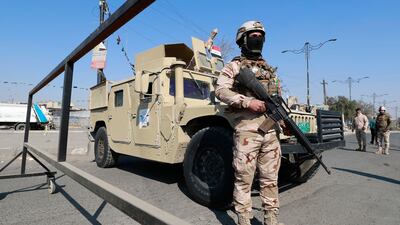Baghdad is unable to rein in the influence of Iranian proxies operating in Iraq, and Tehran-backed officers are working throughout the Iraqi Security Forces' ranks, a Pentagon report on the US-led coalition based in Iraq has found.
In its latest quarterly report, declassified last week, the office of the Pentagon Inspector General pointed to an increasing number of pro-Iran militia attacks against US interests in Iraq and Syria during the last three months of 2021. It said the government has a weak hand when it comes to dealing with Iran-backed militias.
“The Iraqi government’s ability to assert control over the Popular Mobilisation Committee (PMC) or hold its affiliated militias accountable remained tenuous," the report states.
The Baghdad government does not instruct its forces to challenge or confront these militias, despite an assassination attempt against Prime Minister Mustafa Al Kadhimi last November.
Instead, the report highlighted “strong ties” for these militias and Iran “to some elements of Iraq’s traditional security forces."
Specifically, it said former officers from the Badr Corps, the military arm of the Supreme Council for Islamic Revolution in Iraq, are being integrated into the Iraqi ministries of interior and defence, where they retain their ranks and are “often experiencing rapid promotions due to their political ties".
“The [Iraqi] Federal Police and Emergency Response Division, and the Iraqi Army’s 5th and 8th Divisions are the units thought to have the greatest Iranian influence, officers sympathetic to Iranian or militia interests are scattered throughout the security services,” the report states.
“Iran-aligned militias attempt to intimidate ISF units through information campaigns used to threaten security forces to stay away from coalition forces, offset real world weaknesses, and create false narratives in the case of defeats.”
However, the report assessed “that most ISF units remained committed to the Iraqi government and continued to follow orders from the prime minister in his role as commander-in-chief".
Iran-backed groups still pose a threat to US personnel in Iraq and Syria, the report noted, though attacks have gone down.
“The militias still maintained the ability to conduct UAV [drone] and IED [improvised explosive device] attacks against US interests, but have mostly paused attacks during the quarter,” the 142-page-report noted.
It attributed the reduction to a probable desire to manage escalation and evaluate American intentions following the end of the US combat role in Iraq on December 31.
The US announced then that it had completed transitioning its role in Iraq from a combat mission to an advise, assist and enable role.
In Syria, however, the report said Iran-backed groups posed an increased security threat to US forces, and have access to anti-aircraft systems.
Also on the Syrian battlefront, the Pentagon pointed to increasing incidents vis-à-vis Russian forces.
“The Russian military committed an increased number of violations of the deconfliction protocols it has with coalition forces to co-ordinate air and ground movements in Syria, compared with previous quarters.”
The report referenced two rare attacks by pro-Iran militias against Turkish forces in Iraq last quarter.
“These attacks came after Turkey and Azerbaijan conducted joint military exercises near the Iranian border in early October,” it said.
Iran and Turkey are on opposite sides of the conflict between Azerbaijan -- an ally of Ankara -- and Armenia, which maintains close ties to Tehran.
The last time a probable Iran-aligned militia conducted an attack against Turkish forces in Iraq was September 2021, the Pentagon said.


